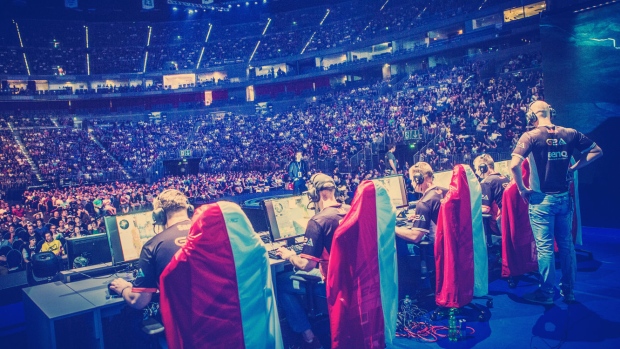Aug 8, 2017
Casinos embrace esports as they work to understand it
Casinos are slowly embracing competitive video game tournaments as a way to help their bottom lines, but the money is coming from renting hotel rooms to the young players and selling them food and drinks, not from turning them into gamblers.
The Canadian Press

ATLANTIC CITY, N.J. — Casinos are slowly embracing competitive video game tournaments as a way to help their bottom lines, but the money is coming from renting hotel rooms to the young players and selling them food and drinks, not from turning them into gamblers.
Like most other ways gambling halls have tried to attract millennials and their disposable income, it hasn't been easy. Caesars Entertainment was first in the nation to adopt skill-based slot machines to woo millennials in Atlantic City, but bailed on them after a few months when the response was underwhelming. Other Atlantic City casinos still use them, however.
Competitive video game tournaments, known as esports, are a growing industry around the world. The fast-paced action, vivid graphics and often violent on-screen action is catnip to millennials, the audience casinos are targeting as their core slot players grow old and die.
But it's been difficult to move them from the video console to the craps table.
"Everybody's still trying to figure out: How do you make this appealing for the consumer and make sense for the business? How do we all profit from this?" said Kevin Ortzman, Atlantic City regional president for Caesars Entertainment, which owns three casinos in the city.
The company in March hosted an esports tournament at Caesars that drew about 900 competitors and spectators.
The bottom line result was encouraging, if not dynamite.
"We certainly experienced a spike in our hospitality offerings — the hotel, food and beverage side of things," Ortzman said. "We didn't see as much on the gambling side, which we weren't terribly surprised by."
But he said coming up with ways to attract millennials is a necessity for the casino industry as a whole, adding that esports players could be cultivated to embrace casinos for video game competitions the way their parents and grandparents went there to play slot machines.
Gambling requires discretionary income and free time, things that people starting their careers or families may not have in abundance, said David Schwartz, director of the Center for Gaming Research at the University of Nevada-Las Vegas.
"The big question is whether people who are 40 or 20 now will begin to play casino games as they get older," Schwartz said. "This isn't a given."
Schwartz agreed the real money for casinos in esports tournaments comes from ancillary spending on food, drinks and hotel rooms.
The Caesars video tournament offered $200,000 in prize money, including a $70,000 top prize, that lured players like Jose Mavo, of Charlotte, North Carolina, who has been playing competitively for a decade and has become a casino customer as a result of being in tournaments hosted by gambling halls.
"We had a tournament in Vegas, and that was the first time I went to a casino, so ever since then, I've been gambling quite a bit," he said, listing blackjack and roulette as favourites.
Alec Collins, of Piedmont, South Carolina, who goes by the competitive name Shock, is only 18, so he's three years away from gambling legally. But it's something he'd like to try then.
"I love Atlantic City so in a few years I would definitely come back and experience the casino a little bit," he said.
Until then, he added, referring to the video game competition, "We're just here to shoot our guns."
Wall Street sees growth potential in esports. Deloitte Global pegged the worldwide esports market last year at $500 million, up from $400 million in 2015, and estimated the industry has a global in-person or online audience of nearly 150 million people a year.
Newzoo, a company following the esports market, predicted in a report that esports will generate nearly $700 million this year, including media rights, ticket and merchandise sales, brand partnerships and game maker investments. The company projects that figure will surpass the $1.5 billion mark by 2019.
One of the biggest supporters of esports among casino owners is Seth Schorr, CEO of the Downtown Grand in Las Vegas, whose casino regularly hosts video game tournaments that, he said, "make a little bit of money." But Schorr said the tournaments offer other revenue opportunities, including suites for groups and meal packages.
"Is it the silver bullet? Of course not," he said. "Is it one tactic in an overall strategy? Of course it is."
___
Follow Wayne Parry at http://twitter.com/WayneParryAC
